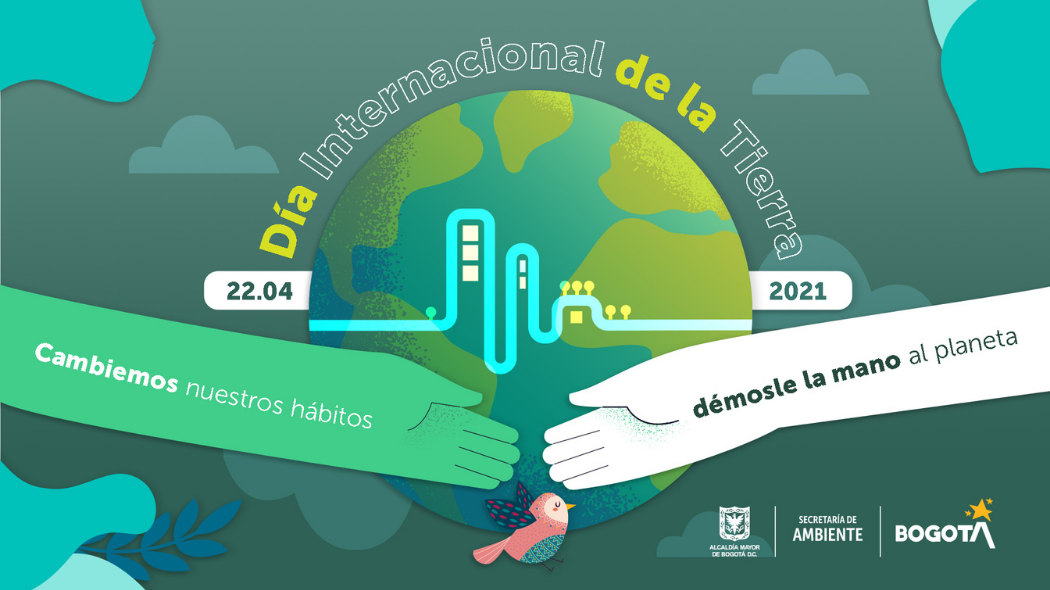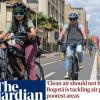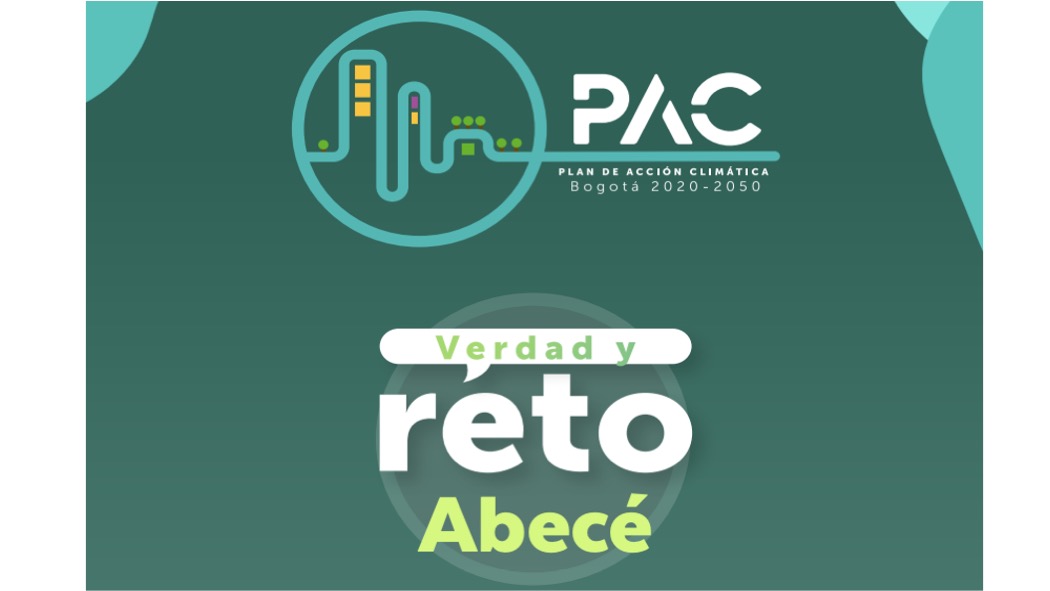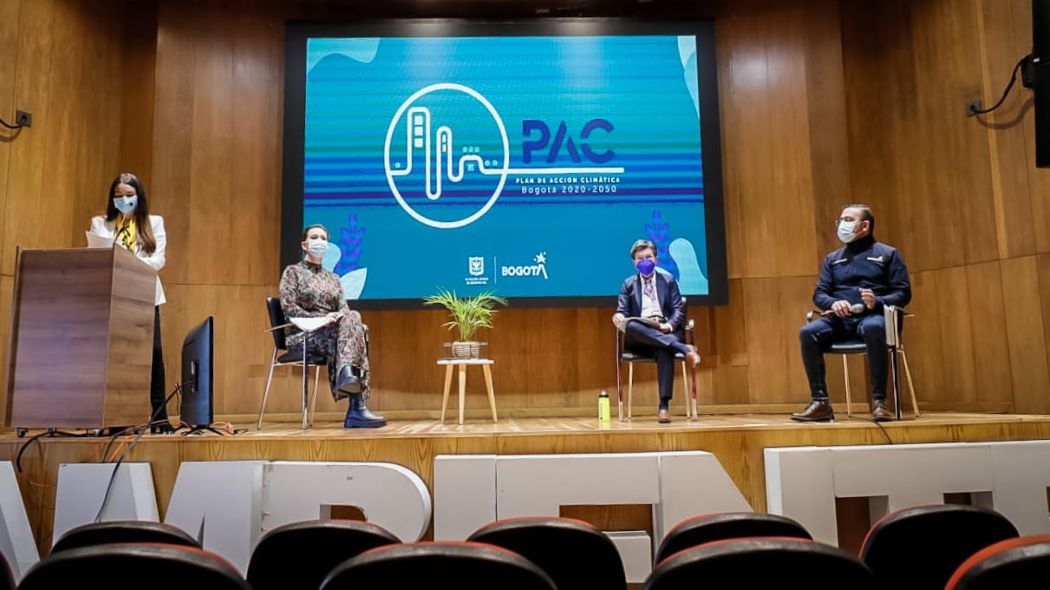Since 1970, World Earth Day has been celebrated every April 22, to raise global awareness of the importance of preserving and protecting natural resources. In the framework of this celebration, this year the Mayor, Claudia Lopez, the Secretary of Environment, Carolina Urrutia, the Director of District Institute of Risk Management and Climate Change (IDIGER by its acronym in Spanish), Guillermo Escobar, and the environmental expert, Paula Caballero, presented the Climate Action Plan - CAP 2020-2050, a roadmap for achieving climate change mitigation and adaptation targets over the next 30 years.
At the beginning of her intervention, the Mayor of Bogotá summarized the main actions of the Plan:
“The Climate Action Plan that we are presenting today can be summarized in 5 strategic macro actions. Considering that 48% of greenhouse gas emissions come from the transportation sector, the first thing we must do is to base our urban mass transportation system, which is currently based on fossil fuels, on a sustainable and regional electric metro network. The second point is to advance in the electrification of our urban bus system. Thirdly, we must achieve greater industrial energy efficiency, to achieve a transition to cleaner sources. The fourth point is related to energy efficiency in buildings, implementing green roofs and walls, urban gardens and the capture and recycling of rainwater. And finally, improving waste management, aligning economic and tariff incentives for separation at source and recycling".
This ambitious Plan seeks to establish the route for the fulfillment of the commitments assumed by the administration to improve air quality in the city, ensure a more sustainable mobility and mitigate the climate crisis. Within these commitments, international agreements such as the Paris Agreement are of vital importance. Bogotá has committed to a 15% reduction in greenhouse gas emissions by 2024, a 50% reduction by 2030 and carbon neutrality by 2050.
"14 of the 45 actions of the Climate Action Plan, are related to the reduction of greenhouse gas emissions, which also contributes to the improvement of the air. Therefore, what we do is to define what the mitigation potential is for each of the actions agreed with each sector, to achieve carbon neutrality by 2050. Bearing in mind that the main contribution is the change from fossil fuels to energy cleaner such as electrification, but also considering transition phases such as the use of gas and other cleaner technologies". Secretary Carolina Urrutia highlighted.
Environmental action is a fundamental theme of the New Social and Environmental Contract for the Bogotá of the 21st Century. In this sense, the Secretariats of Environment and Mobility set 12 goals aligned with the objectives of improving air quality and a more sustainable future. The Climate Action Plan is one of the district's main lines of action to achieve compliance with the air quality recommendations of the World Health Organization (WHO) and become a carbon neutral city.
Other strategies being advanced by the administration to green the city and implement concrete actions to mitigate the climate crisis are related to reducing by 10% the concentration of particulate matter PM10 and PM2.5 in the medium term, as well as the management to implement the District Program for the Management of Emissions from Urban Freight Transportation to have cleaner air in the city.
With regard to actions aimed at greening Bogotá, actions are being carried out for the maintenance, restoration and recovery of the city's Main Ecological Structure and the planting of more than 802,000 trees by 2024.
Another vital factor in contributing to the sustainability of our planet is mobility. Hence the importance of changing citizens' habits and contributing with strategies that help to the mitigation of climate change. On this front, the city is modernizing the Transmilenio fleet with 596 buses, for a total of 1,458 electric buses, and is advancing strategies to increase the number of zero- and low-emission vehicles in Bogotá's fleet to 6,500.
Likewise, an alternative and sustainable transportation scheme is being promoted through the fostering of micro-mobility and a 50% increase in bicycle trips, through a public bicycle policy and the construction of 280 km of bicycle infrastructure. And finally, the adaptation of 20 km of the green corridor of Carrera Septima, where the use of clean energies, pedestrian public space and alternative forms of mobility are privileged.
"The Climate Action Plan also contributes to the mitigation of the multiple environmental risks that many areas of our city have, moving from a reactive attitude to a preventive one. This is a task that must be carried out by all entities in order to reduce vulnerability indexes", informed the IDIGER Director.
As a sign of the city's commitment to plans and strategies that seek a better environmental balance, the United Nations Development Program (UNDP) and the Ministry of Environment and Sustainable Development recognized Bogotá as a "Climate Promise" for its ambitious goals and budgets to adapt to climate change and mitigate its effects.
The commemoration of World Earth Day will last until April 29, with activities carried out by organizations linked to the Environmental Volunteering program of the Secretariat of the Environment, the Local Environmental Commissions, the Environmental Education team of the entity and the local mayors' offices. The Javeriana University will also join this commemoration. The topics to be addressed are related to the care and protection of the Main Ecological Structure and among the scheduled activities will be face and virtual tours, Facebook Live and conferences by zoom, among others.
Today more than ever it is necessary to generate drastic changes in living habits. Changes in production processes and waste management; the implementation of circular economy systems, the care of ecosystems and the reduction of harmful emissions for the planet. The city of Bogotá is committed to working on these fronts.








